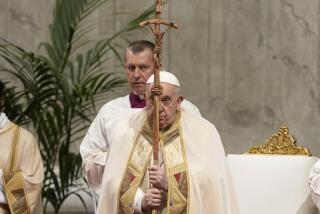Pope Joins Pledge to Fight Anti-Semitism : Vatican: He meets with world Jewish leaders. Both sides renew a commitment to combat the problem in Eastern Europe.
- Share via
VATICAN CITY — In their first meeting since the fall of communism, Pope John Paul II and world Jewish leaders pledged common cause Thursday in combatting renascent anti-Semitism in the emerging democracies of Eastern Europe.
Although both sides hailed the warmth and cordiality of their encounter, the Vatican stood fast against Jewish appeals for diplomatic recognition of Israel.
A 45-minute meeting between the Pope and 20 leaders of the Roman Catholic Church with 30 members of the International Jewish Committee on Inter-Religious Consultations, a worldwide grouping of major Jewish organizations, ended two days of talks. They marked the 25th anniversary of the Second Vatican Council’s denunciation of the teaching of hostility toward Jews.
Seymour Reich, the Jewish committee chairman, said afterward that the meeting represents “the beginning of a new chapter” in Catholic-Jewish relations.
Addressing a group whose representatives last conferred with Vatican officials in 1987, John Paul hailed “the divine mercy which is guiding Christians and Jews to mutual awareness, respect, cooperation and solidarity.”
The Pope echoed a declaration issued after an international liaison committee of Jews and Catholics met in Prague in September and called anti-Semitism “a sin against God and humanity.” The declaration called for special training for priests to combat anti-Semitism and reform of discriminatory allusions in Catholic texts and liturgy.
The Prague conclusions “are of great importance for the continuation of our dialogue and cooperation,” the Pope told the Jewish leaders, expressing the hope that the recommendations “will be implemented wherever human and religious rights are violated.”
“On Prague, the Pope was loud and clear. It is now official church policy that anti-Semitism is a sin and calls for repentance,” said Reich, of Great Neck, N.Y.
In his own address, Reich told the Polish Pope that while democracy is returning to the countries of Eastern Europe, not all of its manifestations are encouraging.
“We cannot be unconcerned over signs that anti-Semitism has once again become political and populist currency in these countries, in desecrations of synagogues and cemeteries, in graffiti on campaign posters, in innuendoes and sometimes more blatant pronouncements in the media, from political leaders and occasionally a church leader. We see a familiar and frightening pattern,” Reich said.
Reich applauded John Paul for “your continuing efforts in condemning anti-Semitism. We are hopeful that your condemnation will influence Eastern European leaders who still continue expressing anti-Semitic remarks in their political activities.”
Renewing longstanding calls by Jewish groups for Vatican recognition of the state of Israel, Reich told Vatican officials that “there can be no full normalization between Jewish and Catholic communities until the Vatican has full normalization of relations with the Jewish state.”
The Vatican asserts the right of Israel to exist with secure borders and maintains routine contacts with Israeli diplomats here. Vatican observers, though, see no prospect of change in the Vatican position that formal recognition must await international agreement on the status of Jerusalem.
More to Read
Sign up for Essential California
The most important California stories and recommendations in your inbox every morning.
You may occasionally receive promotional content from the Los Angeles Times.













